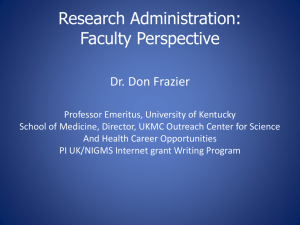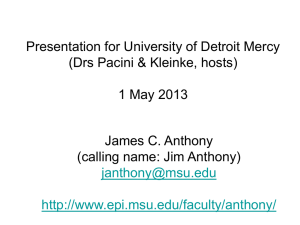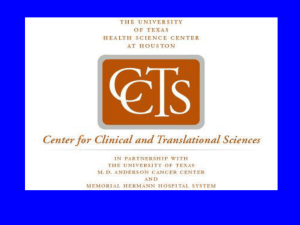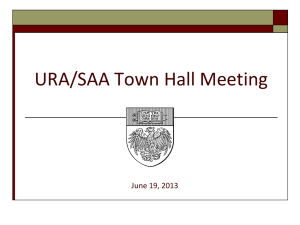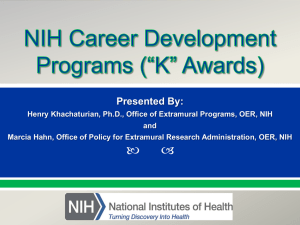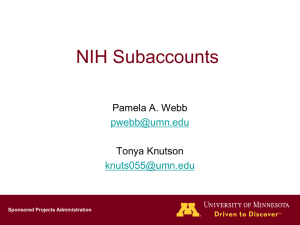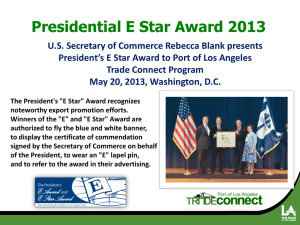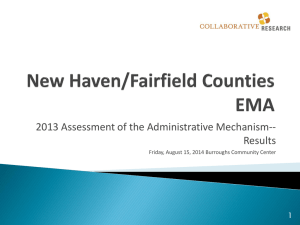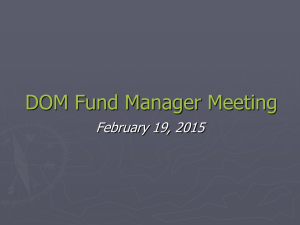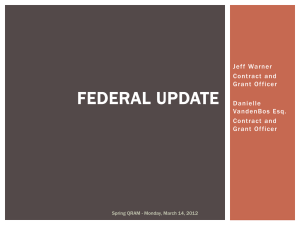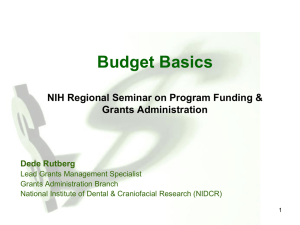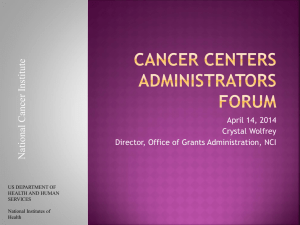Agenda K Meeting – Oct. 3rd, 2007
advertisement
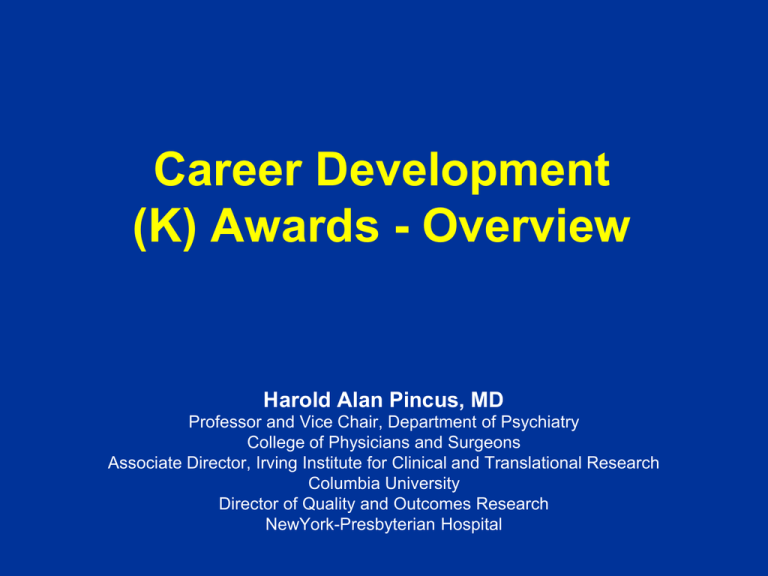
Career Development (K) Awards - Overview Harold Alan Pincus, MD Professor and Vice Chair, Department of Psychiatry College of Physicians and Surgeons Associate Director, Irving Institute for Clinical and Translational Research Columbia University Director of Quality and Outcomes Research NewYork-Presbyterian Hospital Presentation Topics • • • • • • • Housekeeping and expectations Explanation of K Award Preparation for K Award application Application process and format Review process and format Other resources and support Take-away points Housekeeping and Expectations • Attendance of each seminar is key • Sharing of work helps you and others • Reminder email with materials, follow-up email with notes • Plan for Mock Review • K Award Seminar website* (rfmh.nyspi.org/kad) has materials, notes, resources, and syllabus *Access is restricted to computers on NYSPI and Columbia networks (such computers have an IP address that start with 156.111, or 156.145, or 192.168…….) Schedule Date/Time/Location Topic Presenter K Award NIH Cycle I Submission Deadline: Tuesday, June 12th Monday, June 30th 11am – 12pm Location: Room 3002 Overview Harold Pincus Monday, July 28th 11am – 12pm Location: 6th Floor Boardroom Reviewer’s Panel Panelists: To be determined Monday, August 25th 11am – 12pm Location: 6th Floor Boardroom Career Plan Jonathan Posner and Greg Tau Personal Statement Kim Fader Monday, September 22nd 11am – 12pm Location: Room 3001 K Award NIH Cycle II Submission Deadline: Friday, October 12th Monday, October 20th 11am – 12pm Location: Room 3001 Monday, November 24th 11am – 12pm Location: 6th Floor Boardroom Monday, December 22nd 11am – 12pm Location: 6th Floor Boardroom Early-Mid January Research Plan Jill Harkavy-Friedman Administrative Process Janelle Greenhill , Amanda Katz, and Jaime Rubin Funded Applicants’ Panel Mock Review Panelists: To be determined Seminar Participants and Reviewers K Award NIH Cycle III Submission Deadline: Tuesday, February 12th What is a K Award? Career Development (K) Award • Provides predominantly salary support – Specified salary levels (e.g. NIDDK: $90K, NCI: $100K) • Minimum requirements for the amount of effort that must be devoted to research career development (e.g. 75%, some exceptions to 50%) • 3-5 years – Some types of awards are renewable (usually not the mentored awards) • Individual must be a US citizen/permanent resident • Reduce effort to 50% in last 2 years if PI of NIH research grant Adapted from Jaime S. Rubin, PhD (Sponsored Projects: Planning & Organizing a Fellowship or Career Development Proposal) K Awardee National Institute of Environmental Health Sciences Training Directors Meeting November 3, 2010 7 Explanation of “K Award” • • • • • • • • K01 K02 K05 K07 K08 K12 K18 K22 • • • • • • • K23 K24 K25 K26 K30 K99/R00 KL2 http://nexus.od.nih.gov/all/wp-content/uploads/2011/10/k_awards_32.jpg For More Information: NIH Career Development Awards Website http://grants.nih.gov/training/careerdevelopmentawards.htm How do I prepare for a K Award application? Choose a Topic • What topic inspires you? • How has your life led to this topic? – K Award is a scientific autobiography – “vision quest” Adapted from Greg Seigle, PhD, and Chip Reynolds, MD (Med Ed Mentoring - Kountdown to K) K Visioning Exercise 1. In 10 – 15 years, I want to be the world expert in….. 2. In 4 – 5 years, the first major grant to put me on the road towards becoming a world expert, would look like... 3. The knowledge, skills, and training I would need to successfully conduct the major grant are… 4. The preliminary project(s) that would provide initial data and help convince a review committee of the major project’s feasibility and of my own capacities is/are… Create a Timeline • Do you have the time (at least seven months) and schedule to invest in submitting an application? – Prepare = 2 months – Write = 3 months – Revise = 2 months • Which K Award due date and timeline is ideal? Adapted from Greg Seigle, PhD, and Chip Reynolds, MD (Med Ed Mentoring - Kountdown to K) NIH K Award Due Dates Application Stage Cycle I Cycle II Cycle III Due Date (for February 12th June 12th October 12th Scientific Merit June – July Review Advisory August or Council October* Review October – November January February – March May Earliest Project Start Date April July new applications) September or December* *Advisory Council Round for Cycle I applications may be August or October, and their earliest project start date may be September or December respectively. Find a Mentor • A mentor is someone: – You respect – Can help you become an independent scientist – Is well known in the field – Has a good track record of mentorship – Is geographically desirable – Will write you an outstanding letter of recommendation Adapted from Greg Seigle, PhD, and Chip Reynolds, MD (Med Ed Mentoring - Kountdown to K) Mentoring Skills Model MENTEE SPECIFIC SKILLS SHARED CORE SKILLS Acquiring Mentors Learning Quickly Showing Initiative Listening Actively Identifying Goals & Current Reality Building Trust Following Through Encouraging Sense of Humor Managing the Relationship National Institute of Environmental Health Sciences Training Directors Meeting November 3, 2010 MENTOR SPECIFIC SKILLS Inspiring Providing Corrective Feedback Managing Risks Opening Doors Instructing/ Developing Capabilities Mentoring Skills • • • • • • • • • • • Listening actively Identifying goals and current reality Building trust Encouraging Sense of humor Inspiring Providing corrective feedback Managing risks Opening doors Instructing/developing capabilities Constructive Questioning National Institute of Environmental Health Sciences Training Directors Meeting November 3, 2010 21 Mentee Skills • • • • • • • • • • Acquiring mentors Learning quickly Showing initiative Following through Managing the relationship Listening actively Identifying goals and current reality Building trust Encouraging Sense of humor National Institute of Environmental Health Sciences Training Directors Meeting November 3, 2010 22 Brainstorm and Consider • Who will be on your team (at least 1 – 2 internal consultants) that can assist you with translational research? • What will be the size and budget of your research project? • How will you deal with the stress?! • Applying for a federal grant is a marathon, not a sprint Adapted from Greg Seigle, PhD, and Chip Reynolds, MD (Med Ed Mentoring - Kountdown to K) What is the application process and format? Application Process and Format • For applications due on or after 1/25/10 • Re-structured format – Match new peer review process/criteria • Shortened length (25 down to 12 pages) – Reduce administrative burden – Focus on scientific essentials • One re-submission allowed – Previously allowed two re-submissions • Dates of submission are February 12th, June 12th, October 12th • Overall process from submission to review to funding can be 8 to 24 months • NEW: NIH has transitioned to electronic application forms packages (Forms-C). K Awards with due dates after 1/25/14 will likely only have these forms listed but in the case that there are two forms packages available applicants should only use the most recent Application Components Page Limits Section of Application (if different from FOA, FOA supersedes) Introduction to Resubmission or Revision Application (when applicable) 1 Specific Aims 1 First three items of Candidate Information (Candidate's Background, Career Goals and Objectives, and Career Development/Training Activities During Award Period and Research Strategy) 12 pages (for all sections combined) Training in the Responsible Conduct of Research 1 Mentoring Plan (Include only when required by the specific FOA, e.g., K24 and K05) 6 Plans and Statements of Mentor and Co-mentor(s) 6 Letters of Support from Collaborators, Contributors, and Consultants 6 Description of Institutional Environment 1 Institutional Commitment to Candidate’s Research Career Development 1 Biographical Sketch 4 To do list: • Look at others’ (funded) applications and get their advice • Review award guidance and instructions • Familiarize yourself with review process For More Information: Peer Review Policies & Practices http://grants.nih.gov/grants/peer/peer.htm NIH – Writing Your Application: http://grants.nih.gov/grants/writing_application.htm SF424 Application and Electronic Submission Information: http://grants.nih.gov/grants/funding/424/index.htm What is the review process and format? K Review Criteria… • Overall Impact/Priority Score • Scored Review Criteria (Core): 1.Candidate 2.Career Development Plan 3.Research Plan 4.Mentor(s)/Consultant(s)/Collaborator(s) 5.Environment and Institutional Commitment • Additional Review Criteria • Additional Review Considerations Scoring System • 9-point scoring scale – 1 (exceptional) to 9 (poor) – Whole numbers – Assigned reviewers announce scores and rationale – Previous system was 1.0 – 5.0, with increments of .1 Scoring System Descriptions Scoring System Descriptions Score Descriptor Additional Guidance on Strengths/Weaknesses 1 Exceptional Exceptionally strong with essentially no weaknesses 2 Outstanding Extremely strong with negligible weaknesses 3 Excellent Very strong with only some minor weaknesses 4 Very Good Strong but with numerous minor weaknesses 5 Good Strong but with at least one moderate weakness 6 Satisfactory Some strengths but also some moderate weaknesses 7 Fair Some strengths but with at least one major weakness 8 Marginal A few strengths and a few major weaknesses 9 Poor Very few strengths and numerous major weaknesses Minor Weakness: An easily addressable weakness that does not substantially lessen impact Moderate Weakness: A weakness that lessens impact Major Weakness: A weakness that severely limits impact For More Information: Peer Review Policies & Practices http://grants.nih.gov/grants/peer/peer.htm Definitions of Criteria and Considerations for K Critiques http://grants.nih.gov/grants/peer/critiques/k.htm Guidelines and Templates for Reviewers http://grants.nih.gov/grants/peer/reviewer_guidelines.htm Other Useful Websites and Resources • www.nigms.nih.gov/Research/Application/ Tips.htm • www.4researchers.org/ • http://grantscourse.columbia.edu/ • www.nimh.nih.gov/researchfunding/training/index.shtml Other Useful Websites and Resources • Sumandea C, Balke C: Funding Opportunities for Investigators in the Early Stages of Career Development. Circulation 2009; 119:1320-1327 • Research for Mental Hygiene (RFMH) – administrative advice • NIH/Foundation Program Officer • Your mentor • NYSPI/CUMC networks • Us and K Award Seminar website Other (Non-NIH) Career Support • Columbia, NYP, Gerstner, ECRIP • Foundations: RWJ (Health and Society Scholars, Minority/Academic faculty); W.T. Grant Foundation; Pew; Howard Hughes; NARSAD • Professional Societies: APA, ACNP, SBP Take-Away Points • Start early • Be focused • Gather a team of people who can help you go where you want to go • Work with your team to construct application • Take advantage of mentoring • Manage your time and resources wisely • Read instructions • Never assume that reviewers “will know what you mean” • Refer to literature thoroughly and thoughtfully • Explicitly state the rationale of the proposed investigation • Include well-designed tables and figures • Present an organized, lucid write-up Adapted from Greg Seigle, PhD, and Chip Reynolds, MD (Med Ed Mentoring - Kountdown to K) and from Jaime S. Rubin, PhD (Sponsored Projects: Planning & Organizing a Fellowship or Career Development Proposal) Schedule Date/Time/Location Topic Presenter K Award NIH Cycle I Submission Deadline: Tuesday, June 12th Monday, June 30th 11am – 12pm Location: Room 3002 Overview Harold Pincus Monday, July 28th 11am – 12pm Location: 6th Floor Boardroom Reviewer’s Panel Panelists: To be determined Monday, August 25th 11am – 12pm Location: 6th Floor Boardroom Career Plan Jonathan Posner and Greg Tau Personal Statement Kim Fader Monday, September 22nd 11am – 12pm Location: Room 3001 K Award NIH Cycle II Submission Deadline: Friday, October 12th Monday, October 20th 11am – 12pm Location: Room 3001 Monday, November 24th 11am – 12pm Location: 6th Floor Boardroom Monday, December 22nd 11am – 12pm Location: 6th Floor Boardroom Early-Mid January Research Plan Jill Harkavy-Friedman Administrative Process Janelle Greenhill , Amanda Katz, and Jaime Rubin Funded Applicants’ Panel Mock Review Panelists: To be determined Seminar Participants and Reviewers K Award NIH Cycle III Submission Deadline: Tuesday, February 12th Questions???
